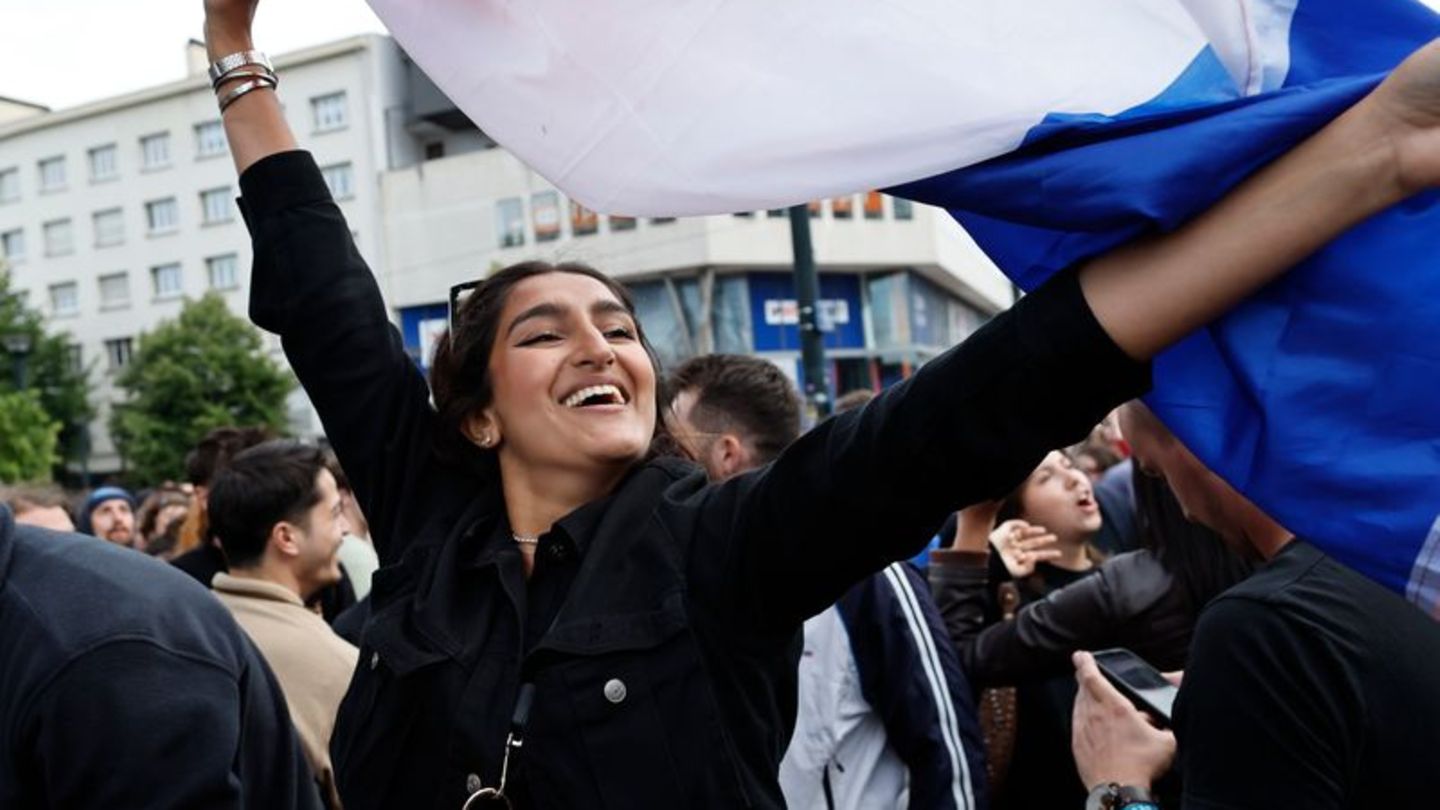A clear result in France’s parliamentary elections – but completely different to what was expected: the left became the strongest force. Difficult weeks are now beginning for Macron.
The day after the unexpected result of the parliamentary election, France has to regroup. The shift to the right is less pronounced than expected – a left-wing alliance is expected to be the strongest force in the newly elected National Assembly. Prime Minister Gabriel Attal has drawn the first conclusions and announced his resignation. However, a majority capable of governing is not yet in sight, and the left lacks a common leadership. It is also uncertain what the result means for Germany and Europe.
According to the Ipsos and Ifop institutes, the Nouveau Front Populaire, made up of leftists, communists, socialists and greens, could win 177 to 192 of the 577 seats – and thus caused a big surprise.
The centre camp of President Emmanuel Macron and Attal, on the other hand, has dropped from 250 to 152 to 169 seats. The Rassemblement National (RN) around Marine Le Pen and its allies has grown from 88 to 138 to 145 seats – and is therefore likely to come in third place. However, none of the groups is likely to achieve an absolute majority of 289 seats.
Victory celebrations and riots
Riots broke out at demonstrations in cities across the country during the night. In Paris, thousands of people gathered on the Place de la République in the center of the capital to celebrate the victory of the left-wing coalition. According to media reports, some of the demonstrators clashed with law enforcement officers, who then used tear gas. Wooden barricades were set on fire. Clashes also broke out in Lille, Rennes and Nantes.
Left sees government responsibility – despite deep divides
France’s divided left had only joined forces a few weeks ago to form the Nouveau Front Populaire. In the European elections at the beginning of June, the parties had still run separately. The main dispute within the left is over the old left-wing leadership icon Jean-Luc Mélenchon. The populist, who has attracted attention with his Eurosceptic statements and pursues a clearly pro-Palestinian course, is being heavily criticized even within his own party.
The alliance of leftists, communists, socialists and greens does not have a clear leadership. There is also no common program.
After their surprise victory, the left still claimed a government. “We have won and now we will govern,” said Green Party General Secretary Marine Tondelier. The founder of the French left-wing party Mélenchon also demanded that Macron ask the left-wing alliance to govern.
Le Pen looks ahead
A landslide victory for the right-wing nationalist Rassemblement National (RN) led by Marine Le Pen was actually expected. After the first round of voting a week ago, forecasts put the RN just short of an absolute majority and thus possibly in a position to form the next government. A government of the right-wing nationalists – probably the worst case scenario for Germany and the EU – seems to have been averted for the time being. Nevertheless, the RN has made significant gains.
Le Pen appeared calm after the first projections: “The tide continues to rise and our victory today is only postponed.” RN leader Jordan Bardella also said that his party was the only alternative to the alleged “unity party” of the left camp and the center forces.
The left and Macron’s centre forces had formed an alliance of convenience before the second round of voting. In order not to take votes away from each other in constituencies where three candidates made it to the second round and thus help the RN to win locally, several candidates from the left and the liberals withdrew. They called on their voters to vote against the RN in any case.
Grand coalition or minority government?
What will happen next is unclear for the time being. It is uncertain whether the Left can form a minority government on its own. The other factions could overthrow such a government with a vote of no confidence.
The left could also try to get support from the centre forces – either as a minority government with tolerance or in a kind of grand coalition. Given the opposing political orientations, however, it is not clear whether this could succeed. The head of the Socialists, Olivier Faure, has also already declared that there should be no “coalition of opposites”.
It is unclear whether President Macron will accept Attal’s resignation and appoint a leftist as prime minister. In such a constellation, Macron would lose power, and the prime minister, who runs the government, would become more important.
What this would mean for Germany and Europe would depend largely on who would take up the post. The left-wing alliance represents very different positions on many major political issues.
Uncertain future
If neither camp can find a government majority, the current government could take over on an interim basis or a government of experts could be appointed. In such a scenario, France is threatened with political deadlock. Another dissolution of parliament by Macron and new elections will not be possible until July 2025.
Source: Stern
I have been working in the news industry for over 6 years, first as a reporter and now as an editor. I have covered politics extensively, and my work has appeared in major newspapers and online news outlets around the world. In addition to my writing, I also contribute regularly to 24 Hours World.




